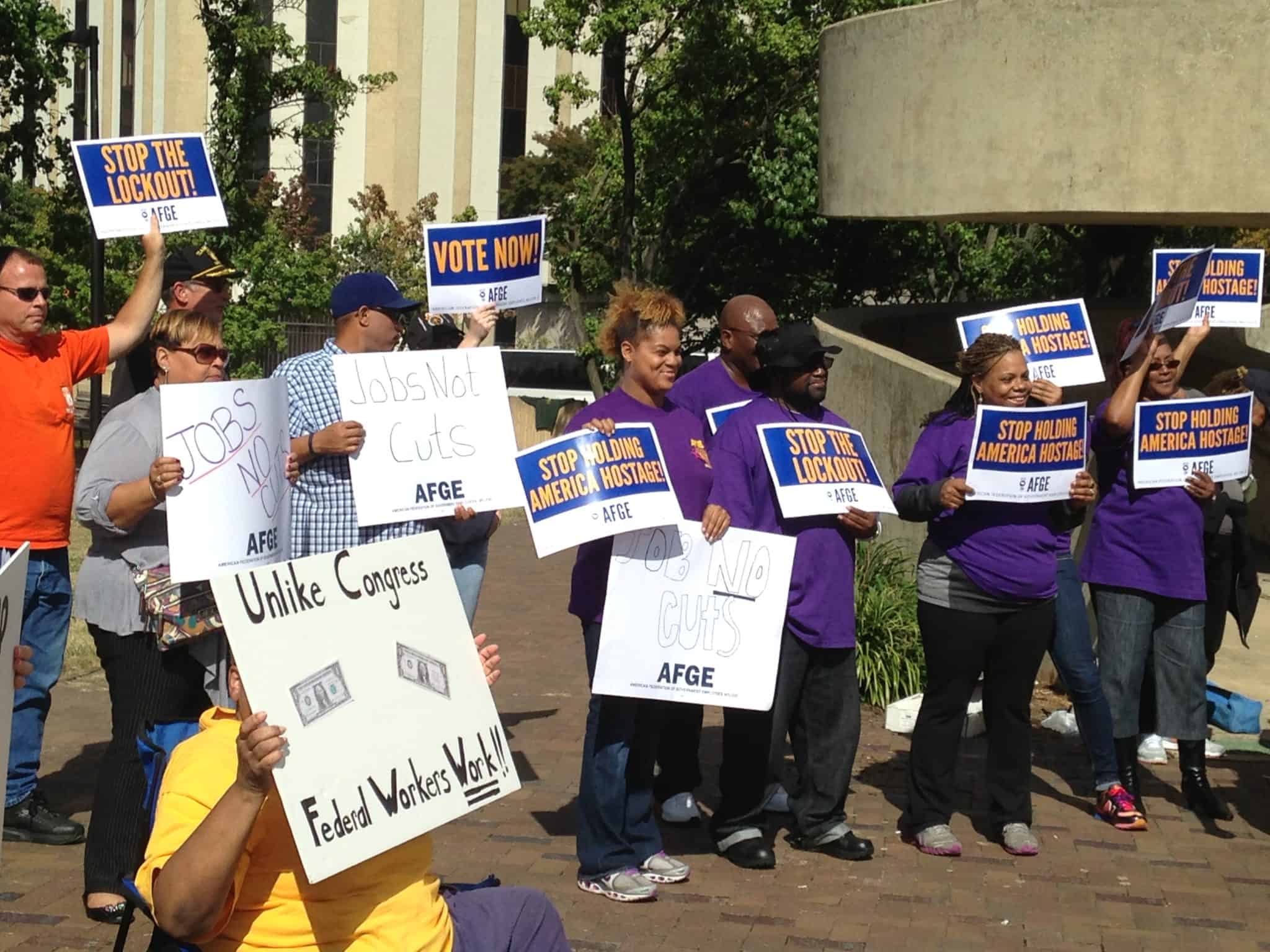
Noah Zatz is Professor of Law at the University of California, Los Angeles.
The federal government shutdown is precipitating a wave of lawsuits and talk of sick-outs and strikes. That should be no surprise when approximately 400,000 federal employees are being required to work without pay. Wait, “required.”?
Talk of being “forced” or “compelled” to work naturally raises questions about the 13th Amendment, which prohibits “involuntary servitude.” Indeed, one federal employee union leader has called the situation “involuntary servitude,” and last week one of the lawsuits raised that claim.
Many legal commentators are understandably skeptical of the 13th Amendment argument, but this extended shutdown situation raises some novel questions. For one thing, employees are being required to work without pay, raising obvious wage and hour questions. Crucially, moreover, this mandate operates in conjunction with a prohibition on federal employee strikes.
The skepticism arises from what kind of “compulsion” creates “involuntariness” for 13th Amendment purposes. Generally speaking, the economic hardship of job loss is not considered to “force” someone to continue working. Indeed, the choice to “work or starve” is a fundamental basis of conventional labor markets, sharpened in combination with wealth inequalities that give workers little safety net absent a regular paycheck.
Of course, this feature has long motivated the charge that capitalist labor markets create “wage slavery,” and there is a long history of efforts in social movement and legal scholarship to ground potentially radical critiques in the 13th Amendment. But claims of economic coercion, ultimately traceable to criminal enforcement of private property, have never found a receptive judicial audience, even in the heyday of 13th Amendment jurisprudence. Instead, the Supreme Court has required “physical or legal coercion,” paradigmatically, threats of personal violence or criminal prosecution.
The critical question in the shutdown context is what, more precisely, do we mean by “required to work”? As a colloquial matter, the idea is that “essential” federal employees can be fired if they fail to report. This, however, is the sense in which all employees are “forced” to work. Absent an unlikely revolution in 13th Amendment jurisprudence, this sense of “required” will not get very far. There is a slight variation on this point that attempts to leverage federal employees’ “property interest” in continued employment and treat its destruction by federal action as “legal coercion.” This appears to be the legal theory underlying the recent lawsuit, but it faces a steeply uphill battle.
What makes this a closer question is the illegality of a strike by federal employees. Were federal employees forbidden to quit, and certainly were they exposed to criminal prosecution for quitting, we would quickly enter the heartland of 13th Amendment protections. That is the legacy of a series of Supreme Court decisions striking down state-enforced peonage in the first half of the 20th century, stretching from Bailey v. Alabama to Pollock v. Williams.
This analogy again requires us to clarify what it means to say that a strike would be “illegal.” The weak version would just mean that strikes lack legal protection, such that workers could be fired summarily for striking. But that is not what the federal prohibition does. First, it applies directly to individual workers, not only to unions. Federal employment of anyone who “participates in a strike” against the United States is prohibited; this seemingly makes termination mandatory, though reality is more complicated. Second, and crucially, strike participation is made a federal crime punishable by imprisonment. By independently criminalizing individual strike action, this statute thus goes beyond circumstances in which individuals have been prosecuted for violating anti-strike injunctions.
Thus, the federal scheme’s 13th Amendment status may turn on the distinction between failing to work and going on strike. If any federal worker who declines to work without pay during the shutdown could be prosecuted as a striker, the 13th Amendment argument would be substantial.
This argument does not depend on the assertion of a robust, general right to strike, something that James Gray Pope has argued is entailed by the 13th Amendment. Indeed, the Supreme Court once summarily affirmed, without opinion, a district court decision upholding the prohibition on federal employee strikes. The underlying district court opinion, however, focused on the absence of employment protections for strikers, not their exposure to criminal liability. Nor did it consider circumstances specific to the current context, such as the demand to work without pay, or that the precipitating event is a federal shutdown, not a breakdown in collective bargaining.
Other courts have also upheld application of the strike ban to federal workers, albeit without substantial reasoning. One affirmed the termination (not prosecution) of an air traffic controller in the PATCO strike on the ground that he could simply have quit, not struck. But in the current context, that distinction might be quite unclear, especially if an employee simply declined to work without pay.
In today’s inherently politicized situation accompanied by extensive public discussion of the hardships federal workers are facing, it is easy to imagine any failure to report to work being subjected to characterization as a strike. In fact, in the PATCO strike cases, federal prosecutors took the position that failure to report to work during a strike could be sufficient evidence for conviction. The court rejected that position for the purposes of a criminal contempt conviction, distinguishing it from the more general proposition that the 13th Amendment permits forcing workers to choose between working and quitting, but not striking. This echoes the Bailey anti-peonage decision where the Court struck down under the 13th Amendment an Alabama statute that made failure to perform an employment contract prima facie evidence of fraudulent intent in entering the contract.
In the present context, where reporting to work means working without pay and the labor issues do not arise from a conventional labor-management dispute, an inference of “striking” from failure to report is particularly inappropriate. But given how broadly “participating in a strike” has sometimes been construed in practice, the threat of prosecution hovers over any failure to report, especially with this President. That threat is what gives rise to involuntary servitude, even if in individual cases workers might eventually be vindicated.
This problem could be avoided were federal workers provided ex ante assurance that failure to report to work without pay would not be deemed to be strike participation. Given how the statutes are written, that also would assure them that they would not be fired. Whether such assurances could, or would, be provided is far from clear. Vice versa, any principle that mere failure to report would be construed as a resignation would raise due process concerns, beyond any statutory ones. And requiring a worker to avoid legal vulnerability by forswearing any collective strike intentions would raise First Amendment questions.
Thus, there is a quite a thicket to be worked through. My point here is simply that the 13th Amendment questions are eminently serious ones. As Chief Justice Rose Bird of the California Supreme Court wrote in an extended defense of a 13th Amendment right to strike, penned in a case of striking public employees, “the amendment is concerned not merely with the formal right to quit, but also with the practical ability of working people to protect their interests in the workplace.” The right to get paid for your work, or to refuse to work without pay, seems like relatively fertile ground on which to test the proposition.






Daily News & Commentary
Start your day with our roundup of the latest labor developments. See all
October 3
California legislation empowers state labor board; ChatGPT used in hostile workplace case; more lawsuits challenge ICE arrests
October 2
AFGE and AFSCME sue in response to the threat of mass firings; another preliminary injunction preventing Trump from stripping some federal workers of collective bargaining rights; and challenges to state laws banning captive audience meetings.
September 30
the NTEU petitions for reconsideration for the CFPB layoff scheme, an insurance company defeats a FLSA claim, and a construction company violated the NLRA by surveilling its unionized workers.
September 29
Starbucks announces layoffs and branch closures; the EEOC sues Walmart.
September 28
Canadian postal workers go on strike, and the Federal Bureau of Prisons cancels a collective bargaining agreement covering over 30,000 workers.
September 26
Trump’s DOL seeks to roll back a rule granting FLSA protections to domestic care workers; the Second Circuit allows a claim of hostile work environment created by DEI trainings to proceed; and a GAO report finds alarming levels of sexual abuse in high school Junior Reserve Officers’ Training Corps programs.